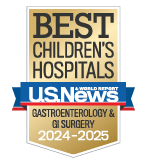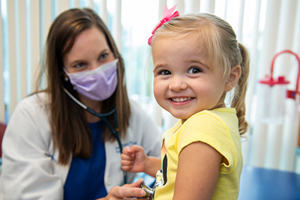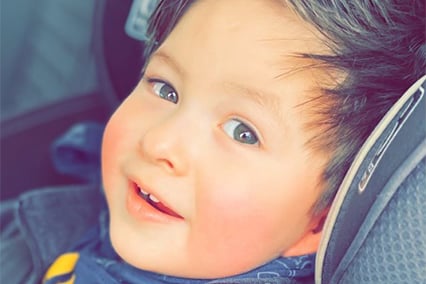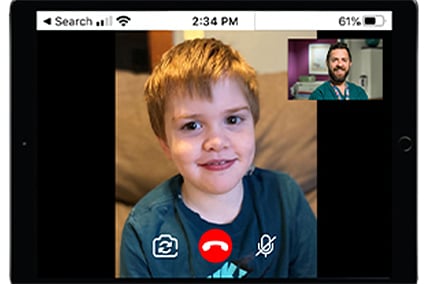Gastroenterology
Nationally ranked by U.S. News & World Report

Gastroenterology
Nationally ranked by U.S. News & World Report

Pediatric Gastroenterology
The Division of Pediatric Gastroenterology at Children’s Mercy is one of the largest in the U.S. We are nationally recognized for providing excellent care for children with intestinal, liver, esophageal and nutritional disorders. Our experienced gastroenterology (GI) team collaborates across departments and incorporates the latest research to give every child the best possible care experience.
Comprehensive care from pediatric experts
Children and teens with GI conditions benefit from our comprehensive, child-centered care. We look at all the possible contributing factors to their disorder to find the best course of treatment.
For example, our Abdominal Pain Program combines mental and physical health care to address the root causes of chronic abdominal pain. Families meet with both a gastroenterologist and pediatric psychologist from their very first visit. Together, they explore the various factors that interact and contribute to chronic abdominal pain and create a treatment plan designed to improve them.
The team in our Polyposis Clinic is breaking new ground with research into hereditary childhood polyposis syndromes - conditions where small growths called polyps cause problems in the digestive tract. Using genetic testing and individualized medicine, the team is able to grow replicas of a child's specific polyps in the lab to test and see which medication will work best for that child.
Meet the team
We have many GI specialists at work to help care for children with a wide range of conditions. Our care team includes not only pediatric gastroenterologists and advanced practice nurses, but also clinical psychologists, nutrition support nurses, dietitians, social workers and pharmacists.
Meet the entire team of pediatric GI specialists at Children’s Mercy.
Caring for the whole child
Physical, mental, emotional and social aspects can all play a role in abdominal pain, constipation and other common GI concerns. Often there are biological factors (like inflammation, hypersensitivity and gut flora), psychological factors (like mood, anxiety and sleep problems) and social factors (like relationships with family members and peers or problems at school) that contribute to the problem.
Treating just one area at a time may not be effective, but when we take a combined approach to care, the majority of families report significant improvement in their child’s condition.
Research
Our commitment to providing the best medical care goes hand-in-hand with our dedication to discovering new and more effective treatment methods through clinical research. Current GI research areas include abdominal pain, inflammatory bowel disease, liver care, polyposis, GI issues in children with autism, and many other areas. We also collaborate with the Genomic Medicine Center to diagnose gastroenterology conditions at the genetic level.
Powering Children’s Potential
We have over 70 active research projects ongoing within GI and I think one of the most impactful is our partnership with the Genomics Center, collaborating with Genomic Answers for Kids, diagnosing GI conditions and GI diseases at the genetic level. It has been an incredibly great partnership. We are actively researching in areas of abdominal pain, polyposis and inflammatory bowel disease, as well as liver and drug delivery systems.

Learn more about what makes our Division of Pediatric Gastroenterology one of the best in the nation in this new Powering Children’s Potential video.
Watch the videoClinical Services
Celiac disease in children causes gluten to damage villi, the finger-like projections in the small intestine responsible for absorbing nutrients from food. When the villi are damaged, the body can't absorb nutrients the body needs to grow. If that happens, a child can become malnourished.
Children’s Mercy is home to one of a very few comprehensive colorectal centers in the nation. We take a team-based approach to care for children with colorectal malformations such as Hirschsprung Disease and other anorectal and pelvic floor disorders.
The BRICK (Bowel Retraining in Constipated Kids) clinic is a special clinic within the Division of Gastroenterology at Children’s Mercy Hospital dedicated to the care of children with constipation and encopresis. This clinic targets children 3 years and older who struggle with constipation and soiling, but are otherwise healthy.
Often called EOE, Eosinophilic Esophagitis is a type of allergic inflammation in the esophagus often triggered by a reaction to certain foods. While milk and wheat products are the most common culprits, it’s not always clear what the trigger might be.
The Inflammatory Bowel Disease (IBD) Clinic provides comprehensive health care for children and adolescents with IBD, in particular Crohn's Disease and Ulcerative Colitis. Our clinic is a family-centered environment that recognizes the physical, emotional, behavioral, financial, and social needs of children and families.
The Intestinal Rehabilitation Program at Children’s Mercy provides a comprehensive approach to caring for children of all ages with intestinal failure, including short bowel syndrome.
The Liver Care Center is designed to provide a medical home for children dealing with highly complex liver disease. More than 900 children and teens with a wide range of liver diseases are receiving ongoing care in our clinics.
Chronic abdominal pain is a common problem that affects up to 20 percent of all school-aged children and teens. The Abdominal Pain Program at Children’s Mercy is a unique clinical and research program devoted to the evaluation and treatment of pediatric abdominal pain.
The Children's Mercy Pediatric Motility program, part of the nationally recognized Division of Gastroenterology, offers some of the best pediatric care for children with all types of gastrointestinal motility disorders. Families frequently travel from across the U.S. so children with previously unexplained cases can be treated in the program.
The Polyposis Center at Children's Mercy Kansas City offers specialized care for children with gastrointestinal polyposis. We are the only comprehensive, multidisciplinary team in the region with expertise in diagnosing and treating pediatric polyps and related syndromes.
Conditions
-
Gastroesophageal reflux
-
Obesity-related liver disease
-
Gastrointestinal bleeding
-
Liver disease
-
Biliary disease
-
Hepatitis
-
-
Malabsorption/FTT
-
Intestinal Rehabilitation Center:
-
Necrotizing enterocolitis
-
Gastroschisis
-
Volvulus
-
Motility disorders
-
Malrotation
-
Short-gut syndrome
-
Stories
Crohn's disease: Leah's story
Leah Steinacker was a busy, active high school senior when sudden, severe stomach pain landed her in the hospital at Children’s Mercy. Her experience receiving care for Crohn's disease inspired her Master's thesis project - a waiting room kit for kids.

Swallowed magnets: Elijah's story
Normally a high-energy kid, Elijah’s ongoing nausea and fatigue sent him to the ER multiple times. When his mom pushed for an X-ray, they discovered Elijah had ingested 37 tiny magnets. Find out how Children’s Mercy helped Elijah find his spark again—and why magnets aren’t toys!

Rumination disorder: Austin's story
Austin is a kid who loves creative activities - many of which help him manage his rumination syndrome. Through a multidisciplinary approach, the Rumination Disorder Clinic has helped Austin find techniques to help with his body's involuntary response to swallowing food.

Delivering complex medical care via telemedicine: TJ’s story
Several complex medical conditions make visits to Children’s Mercy a challenge for TJ DeCow. Now, telemedicine visits are making it possible for TJ’s doctors to check in on him remotely, reducing his anxiety level, saving travel time to and from the hospital, and limiting time away from work for his mom.

Treatments offered
-
Consults by our pediatric-dedicated nutrition support team
-
Urgent outpatient consultation or visits can be accommodated upon physician request by speaking with a GI physician.
-
Enteral and parenteral nutrition therapies
-
Pediatric Endoscopy procedures include:
-
Upper endoscopy
-
Colonoscopy
-
Small bowel capsule
-
Therapeutic advanced endoscopy: balloon dilation, polypectomy
-
Double-balloon enteroscopy
-
Transnasal endoscopy
-
Esophageal and rectal manometry
-
PEG tube placement
-
Percutaneous liver biopsy
-
Esophageal pH studies (including BRAVO)
-
Breath hydrogen analysis
-
Fecal transplant
-
-
Intestinal Rehabilitation Center:
-
Intestinal rehabilitation
-
Surgical repair
-
Bowel lengthening procedure
-
Research
-
Nutrition support
-
TPN-induced liver disease
-
Intestinal atresia
-
Malabsorption diseases
-
Pseudo obstruction
-
- Gastroenterology
- Celiac Disease
- Constipation and Encopresis
- Feeding Clinic
- GI Procedures: What to Expect
- Inflammatory Bowel Disease
- Intestinal Rehabilitation Program
- Liver Transplant
- Pediatric Abdominal Pain Program
- Pediatric Gastroenterology Fellowship
- Pediatric Motility
- Rumination Disorder Clinic
- Meet the Team
